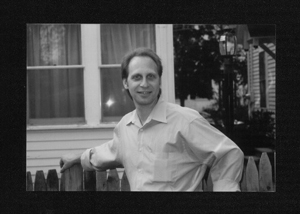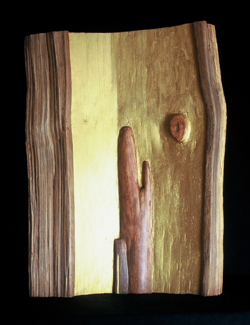INTERVIEW WITH RICHARD WOLLMAN

Write a Bio about yourself
I started out working with severely disturbed three and four year olds.. I was a clam shucker for a while, but
it was ruining my hands. I spent time working on an excavation of an ancient city in Israel. I was both an editor
and a production coordinator in the art department of medical magazine. Then I became a student again and put in 6
years of graduate work to get a doctorate at Columbia University, where my specialty was 17th-Century literature.
In one way or another I loved these jobs.
But the things that mean the most to me have all been self taught--music, poetry, and sculpture-the purity and
delight of not knowing anything yet fulfilling the desire to do something special.
One day, while making a presentation of my sculptures and poems to my son's 3rd grade class, a kid asked me what
was my most treasured possession? He had the sculptures in mind. I pointed at my son, Teddy, my treasure, my joy.

What space do you write in? Describe it for the readers.
I write in a bare studio on the third floor of my house (I also sculpt in the same room). My window shows
a fraction of the sky, the floors are wide pine boards (painted brick red) and the walls are a pale yellow.
They glow in the sunlight. I say "bare" because I need as little stimulation as possible-I don't keep many
books up there or anything that would take away from the kind of poverty I need in order to write. I think of
it as zeroing down. Now my sketches and wood sculptures surround me but that works for me since they are all
representations of poems I've written. They don't compete.
Where do you find inspiration for writing?
In so many places. Reading usually inspires me to write. Another mind at work provokes poetic response in me.
A great many of my poems were inspired by prose in The New Yorker, especially those treatments of people and historical
events that cry out for poetic rendering. "Relativity in America, 1936," which won the Gulf Coast Poetry Prize, is about
Einstein and Gödel at Princeton after they escaped the Nazis. "A Cemetery Affair," the title poem from my chapbook, and
new poems about composer Harry Partch and artist Martín Ramírez, all came from pieces I read in The New Yorker.
Teaching at Simmons College also inspires me-well, my students do. My training as a specialist in early literature
and the Bible provokes all kinds of ideas for poems, ideas that are distinctly different from my academic work.
Art inspires me, especially art that I find poetic: Matisse's paintings, Lester Young's tenor sax solos (I'm listening
to him as I write this), Martha Graham's choreography.
Travel, too. I wrote my first book after living in Provence for the summer. Evidence of Things Seen has many poems
set in Languedoc-Rousillon and northern Spain. I find nothing more inspiring than being an outsider who is forced to
see the world anew. In my Harry Partch poems, I wrote that the Chinese poet, Li Po, "had nine hundred places he called home."
I can't get inside without feeling outside first.
What is the strangest thing you've done to find writing material?
I don't know that I have done anything strange to find writing material, if only because I don't look for material.
It's like love: if you have to look, you're already in trouble.
Talk about your book, Evidence of Things Seen (Sheep Meadow Press, 2006), and your chapbook, A Cemetery Affair
(Finishing Line Press, 2004).
Evidence of Things Seen is a title that riffs on St. Paul's "Faith is the evidence of things not seen."
There are more than a few poems that treat the Holocaust, a horror that has considerable presence in both
of my books. Especially since the remaining survivors are so old now, I worry, like so many others,
about who will sing for them.
"Evidence" is important to me. The things that last-or should last. I think it accounts for the many sculptures
I've made from these poems. I wanted to make my own physical evidence of the desire that has its origin in pain
and its final expression in joy. I think of the poems from these books as doing the same sort of thing.
What are you working on now?
I'm completing a manuscript of my third collection, The Art of Need, which contains many poems about outsiders
whose passion to make art took them to the heights of the imagination. Harry Partch was so dissatisfied with the
current state of music in the early twentieth-century that he not only made all his own instruments but developed
his own musical scale! Another long sequence is on Martín Ramírez, a self-taught artist who did all his work in a
state mental hospital in Stockton, California. He didn't speak for thirty years. The drawings said everything.
I wrote that poem this April while at the Virginia Center for the Creative Arts.
I'm interested in what people need, and the book is about the art that comes from that need. I suppose it's ultimately
autobiographical since I would place myself in the same category. I don't like the world the way others present it to me.
I need something else. So I write poems.
Who are you reading now?
I'm reading anything by Jack Gilbert, a poet whose life's work is an impressive collection of honest poems that cut
me to the quick. I'm reading a nineteenth-century book on wood engraving, another on the history of salt, and another
on the café society and avant-garde movement in 1920s Paris.
I'm also reading (again and again) Sarah Hannah's first book, Longing Distance and her forthcoming book Inflorescence
(which I have in manuscript). Sarah Hannah, who died only a few months ago, was my closest friend and a damned fine poet
(reminiscent of Emily Dickinson). I hope people will read her and see that her two books are superb and important.
You teach at Simmons College. What do you try to teach your students about writing? What challenges do you face with teaching?
My goal is to teach my creative nonfiction students that each of them is an interesting person, which to me is the
bedrock of good writing-and they produce some fine writing indeed. My goal with my poetry students is to suggest that
everything that they write is not interesting, that they must be willing to change. Change hurts-but not
changing hurts worse.
Describe the Boston writing scene.
I think there are many others more qualified to answer this question, but I know a little about the many different
writing scenes in Boston. The New England Poetry Club is a mainstay-it's the first place I ever read my work publicly.
Diana Der Hovanessian has been an inspiration and a welcoming presence for years and years. Rebecca Morgan Frank,
who edits the cool online jounal Memorious and coordinates the prestigious Blacksmith reading series, has, with
Rob Arnold, made real contributions to the writing scene in Boston. Doug Holder and Harris Gardner both run multiple
reading series; both have dedicated their existence to poets and poetry. But there are many more writers contributing
to the myriad poetry events in Boston.
I'm a member of the Powow River Poets, led by Rhina Espaillat in Newburyport, where I live. I'm biased, of course,
but we've been called the most successful poet's group in the country. With colleagues like Rhina, Alfred Nicol,
Deborah Warren, Bill Coyle, Len Krisak, A.M. Juster, Bob Crawford, Midge Goldberg, and the incredible David Berman,
I'm in very good company indeed.
What writers make you tick? Ones that you read over and over….
Wallace Stevens. I read him daily, like scripture-both the poetry and the prose-and find his gifts and his insight
regarding the imagination inexhaustible. I'm not sure the poetry world has caught up with him yet, but I know for
certain that reading him always makes me want to write.
Another close friend, Sean Singer, whose first book-Discography-- won the Yale Younger Poets award, is one I read constantly.
He's so gifted-to my mind, he's the future of poetry.
Others: Kafka, Primo Levi, Jean Amery, Paul Celan, Czeslaw Milosz, Zbigniew Herbert….
There isn't enough space to go on.

|

